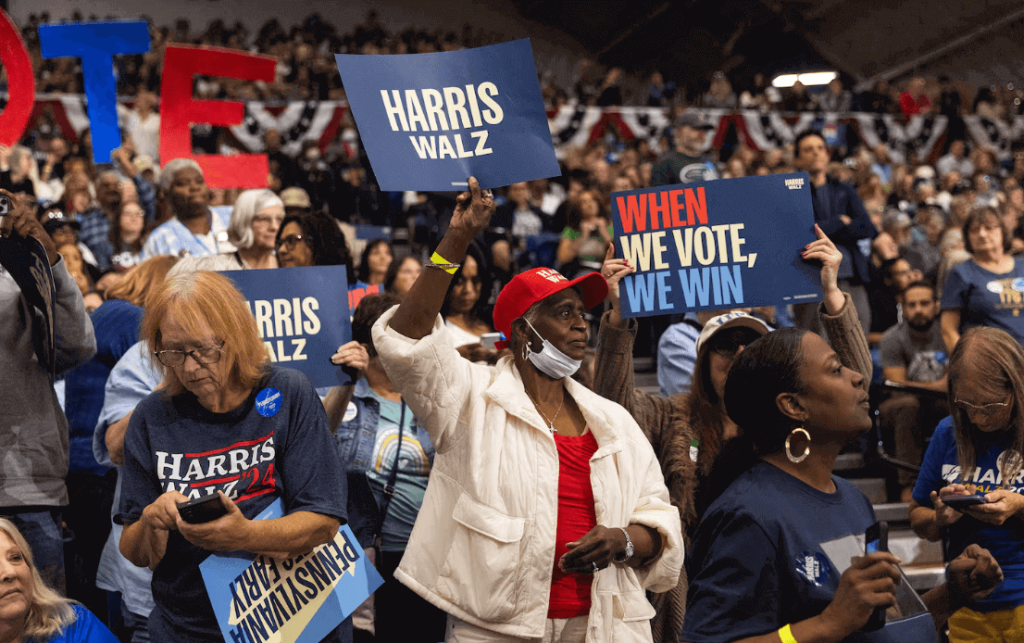【中美创新时报2024 年 10 月 13 日编译讯】(记者温友平编译)自拜登总统退出总统竞选以来,副总统卡马拉·哈里斯在黑人选民中的地位有所提高,但根据《纽约时报》/锡耶纳学院对黑人潜在选民的民意调查,她仍然远远落后于拜登 2020 年在这一重要民主党选区的份额。《纽约时报》记者玛雅·金、乔纳森·韦斯曼和露丝·伊吉尔尼克对此作了下述报道。
民意调查发现,全国近 80% 的黑人选民表示他们会投票给哈里斯,与拜登 7 月退出竞选前表示会支持他的黑人选民比例(74%)相比,这一比例有显著增加。但拜登赢得了 90% 的黑人选民,以微弱优势入主 2020 年白宫,而哈里斯的支持率如果持续下降,将严重危及她赢得关键战场州的机会。
民主党一直指望黑人选民会大举支持,这些选民是因为他们有机会选出第一位黑人女总统,而且他们对前总统唐纳德·特朗普感到厌恶,特朗普对哈里斯种族身份的质疑、对“黑人工作”的评论以及对海地移民的妖魔化,将他长期以来的种族主义攻击推到了竞选活动的风口浪尖。
毫无疑问,哈里斯有望赢得绝大多数黑人选民的支持,但特朗普似乎正在蚕食民主党长期以来的优势。他的竞选活动依靠定向广告和零星的外展活动来争取非裔美国选民——尤其是黑人男性——的支持率有所上升。根据新民意调查,约有 15% 的黑人可能选民表示他们计划投票给这位前总统,比四年前增加了 6 个百分点。
民意调查显示,哈里斯支持率下降的主要原因是人们越来越相信民主党未能兑现承诺,而民主党长期以来一直将黑人选民视为党的“支柱”。约 40% 的 30 岁以下非裔美国选民表示,共和党比民主党更有可能履行其竞选承诺。
“他们把桌上的残羹剩饭像我们训练有素的狗一样扫掉,然后说,‘这是给你的’,”63 岁的拉佩奇·德雷克 (LaPage Drake) 来自德克萨斯州锡达希尔 (Cedar Hill),就在达拉斯郊外,他这样评价民主党。“我们像训练有素的海豹一样鼓掌。”
拥有一家树木移除服务的德雷克表示,他将支持特朗普。
“不管人们怎么称他为种族主义者之类的,他都是为了美国这个国家,”德雷克说。
副总统在黑人女性中的支持率很高,约为 83%,而 12% 的黑人女性表示会支持特朗普,5% 的人尚未决定。但拜登在黑人男性中的支持率与 2020 年相比大幅下滑,这一数字令人震惊;70% 的人表示他们会在 11 月投票给哈里斯,低于 2020 年的 85%。这与更广泛的性别差距相符,但在黑人选民中相对较新。
尽管如此,尽管特朗普不断努力说服非裔美国选民,他们在他担任总统期间过得更好,但现在比 2 月份更多的黑人选民表示拜登-哈里斯政府的政策对他们有所帮助。现在说特朗普的政策对他们有帮助的人少了很多。
周四晚上,在匹兹堡,前总统巴拉克·奥巴马直接呼吁那些可能对支持哈里斯犹豫不决的黑人男性,暗示许多人“只是不喜欢让女性担任总统”,并提醒他们“我们生活中的女性一直在支持我们。”
哈里斯的盟友指出,她在担任副总统期间为降低黑人失业率、稳定医疗成本和增加对传统黑人学院和大学的资助所做的工作,是为黑人社区做出的协调一致和可衡量的努力的例子。在最近的采访中,哈里斯表示,她知道非裔美国选民不会蜂拥而至支持她的竞选活动,这并不是定论。
为了接触这些选民,哈里斯的竞选团队已经开始了对传统黑人学院和大学的巡演,并将于周末开始推动在战场州吸引黑人信仰选民。哈里斯还试图通过替代活动和非传统媒体采访来吸引黑人男性,包括最近出现在前职业篮球运动员马特·巴恩斯和斯蒂芬·杰克逊主持的播客“All the Smoke”中。
副总统原定于周二出席底特律早间广播节目“早餐俱乐部”举办的市政厅式活动,该节目主持人之一查拉曼尼·塔·戈德周五表示。这个全国联合播出的节目在黑人千禧一代中很受欢迎。
非裔美国选民对哈里斯个人的看法确实远比对特朗普好;75% 的人表示哈里斯会更好地处理对他们个人而言重要的问题。只有 17% 的人认为特朗普会。
“我觉得她比他更有能力胜任这份工作,”47 岁的北卡罗来纳州格林斯博罗卡车司机威廉·考克斯 (William Cox) 说。“她更代表对我家人更好的立场。”
但在具体问题上,黑人选民意见不一。民意调查发现,56% 的人表示美国应该少关注海外问题,多关注国内问题,这一立场更能反映特朗普的观点,而不是哈里斯的观点。约 40% 的黑人选民支持特朗普修建边境墙,41% 的选民支持驱逐非法入境的移民,特朗普曾表示将大规模驱逐非法入境的移民。这一比例低于反对该提议的 52%,但仍是黑人选民中相当一部分。
特朗普在竞选结束时使用越来越本土主义的言论和恐吓策略,经常描绘出一幅虚假的画面:美国城市犯罪猖獗,而非法入境的移民是罪魁祸首。事实上,美国城市的暴力犯罪率已经下降。
但 47% 的非裔美国选民(占多数)表示,大城市的犯罪已经失控,似乎站在特朗普的描述一边。42% 的人同意对这个问题更温和的表述:犯罪是大城市的一个主要问题,但并没有失控。
尽管如此,哈里斯在非裔美国选民中遇到的问题与她在其他选区遇到的困难是一样的:经济。近四分之三的黑人选民将经济状况评为一般或较差,经济状况和堕胎问题被评为最紧迫的问题。超过七成的黑人选民表示,他们因为成本问题而减少了食品杂货支出;56% 的人表示,他们经常减少食品杂货支出。
整整 78% 的黑人选民表示,种族问题仍然是阻碍他们取得进步的重大障碍,其中 21% 的人表示,民主党没有解决这些障碍的办法。
然而,对哈里斯有帮助的是,她的政党在帮助低收入有色人种方面仍然享有盛誉,这一声誉在广大黑人选民中依然存在。
“当我们有民主党总统时,情况确实会变得更好,”34 岁的北卡罗来纳州诺伍德家庭保健员工 Queneshia Baldwin 说,她补充说她会投票给哈里斯。“我认为问题更多的是共和党人。”
本文最初发表于《纽约时报》。
题图:10 月 10 日,人们在匹兹堡菲茨杰拉德体育馆等待前总统巴拉克·奥巴马抵达哈里斯-沃尔兹竞选集会。MADDIE MCGARVEY/NYT
附原英文报道:
Black voters drift from Democrats, imperiling Harris’ bid, poll shows
By Maya King, Jonathan Weisman and Ruth Igielnik New York Times,Updated October 12, 2024
People waited for former president Barack Obama to arrive at a Harris-Walz campaign rally at the Fitzgerald Field House in Pittsburgh, on Oct. 10.MADDIE MCGARVEY/NYT
Vice President Kamala Harris has improved her party’s standing among Black voters since President Biden left the presidential race, but she still significantly trails Biden’s 2020 share of that vital Democratic constituency, according to a New York Times/Siena College poll of Black likely voters.
Nearly 8 in 10 Black voters nationwide said they would vote for Harris, the poll found, a marked increase from the 74% of Black voters who said they would support Biden before he dropped out of the race in July. But Biden won 90% of Black voters to capture the White House by narrow margins in 2020, and the drop-off for Harris, if it holds, is large enough to imperil her chances of winning key battleground states.
Democrats have been banking on a tidal wave of support from Black voters, drawn by the chance to elect the first Black female president and by revulsion toward former President Donald Trump, whose questioning of Harris’ racial identity, comments on “Black jobs” and demonizing of Haitian immigrants pushed his long history of racist attacks to the forefront of the campaign.
Harris is no doubt on track to win an overwhelming majority of Black voters, but Trump appears to be chipping away broadly at a longstanding Democratic advantage. His campaign has relied on targeted advertising and sporadic outreach events to court African American voters — especially Black men — and has seen an uptick in support. About 15% of Black likely voters said they planned to vote for the former president, according to the new poll, a 6-point increase from four years ago.
Much of the erosion in support for Harris is driven by a growing belief that Democrats, who have long celebrated Black voters as the “backbone” of their party, have failed to deliver on their promises, the poll showed. Some 40% of African American voters younger than 30 said the Republican Party was more likely to follow through on its campaign commitments than Democrats were.
“They sweep table scraps off the table like we’re a trained dog and say, ‘This is for you,’” LaPage Drake, 63, of Cedar Hill, Texas, just outside Dallas, said of the Democratic Party. “And we clap like trained seals.”
Drake, who owns a tree removal service, said he would back Trump.
“Regardless of how people call him racist and stuff, he is for the country of America,” Drake said.
The vice president’s support from Black women is strong, about 83%, while 12% of Black women said they would back Trump, with 5% undecided. But the slip from Biden’s 2020 numbers among Black men is striking; 70% said they would vote for Harris in November, down from 85% in 2020. This is in line with the gender gap more broadly, but relatively new among Black voters.
Still, despite Trump’s continuing efforts to convince African American voters that they were better off during his presidency, more Black voters now, than in February, say the policies of the Biden-Harris administration have helped them. Substantially fewer now say that Trump’s policies helped them.
In Pittsburgh on Thursday night, former President Barack Obama appealed directly to Black men who might be on the fence about supporting Harris, suggesting that many “just aren’t feeling the idea of having a woman as president” and reminded them that the “women in our lives have been getting our backs this entire time.”
Allies of Harris point to her work as vice president to lower Black unemployment, stabilize health care costs and increase funding for historically Black colleges and universities as examples of a concerted and measurable effort to deliver for Black communities. In recent interviews, Harris has said that she knows it is not a foregone conclusion that African American voters will flock to her campaign.
In an effort to reach these voters, Harris’ campaign has started a tour of historically Black colleges and universities, and will begin a push to engage Black faith voters in battleground states over the weekend. Harris has also sought to engage Black men through surrogate events and nontraditional media interviews, including a recent appearance on the podcast “All the Smoke,” hosted by former professional basketball players Matt Barnes and Stephen Jackson.
The vice president was scheduled to attend a town-hall-style event in Detroit on Tuesday hosted by the morning radio program “The Breakfast Club,” one of the show’s hosts, Charlamagne Tha God, said Friday. The nationally syndicated show is popular with Black millennials.
African American voters do have a far more favorable view of Harris personally than of Trump; 75% said Harris would do a better job handling the issues important to them personally. Only 17% said Trump would.
“She’s more capable of doing the job than he is, I feel,” said William Cox, 47, a truck driver in Greensboro, North Carolina.. “She stands more for what betters my family.”
But on specific issues, Black voters were divided. The poll found that 56% said the United States should pay less attention to problems overseas and concentrate on problems at home, a position more reflective of Trump’s views than Harris’. About 40% of Black voters favor Trump’s border wall, and 41% support deporting immigrants in the country illegally, something Trump has said he will do en masse. That is fewer than the 52% who oppose that proposal but still a substantial piece of the Black electorate.
Trump, closing out his campaign with increasingly nativist rhetoric and scare tactics, frequently invokes a false picture of crime running rampant in the nation’s cities, driven by immigrants in the country illegally. In fact, violent crime in U.S. cities has fallen.
But 47% of African American voters, a plurality, said crime in big cities had gotten out of control, seemingly siding with Trump’s portrayals. And 42% agreed with a more moderate phrasing of the issue: Crime is a major problem in big cities, but it is not out of control.
Still, Harris’ problems with African American voters rest on the same issue that her struggles with other constituencies do: the economy. Nearly three-quarters of Black voters rated the economy fair or poor, and the economy along with abortion were rated their most pressing concerns. More than 7 in 10 Black voters said they had cut back on groceries because of cost; 56% said they had cut back often.
Fully 78% of Black voters said race still posed significant obstacles to getting ahead, and of that figure, 21% said the Democratic Party had no solutions to address the obstacles.
What could help Harris, however, is her party’s still-enduring reputation for aiding low-income people of color, which persists among a broad swath of Black voters.
“Things do get better when we have Democratic presidents,” said Queneshia Baldwin, 34, a home health employee in Norwood, North Carolina, who added that she would vote for Harris. “I think it’s more so the problem is with Republicans.”
This article originally appeared in The New York Times.

